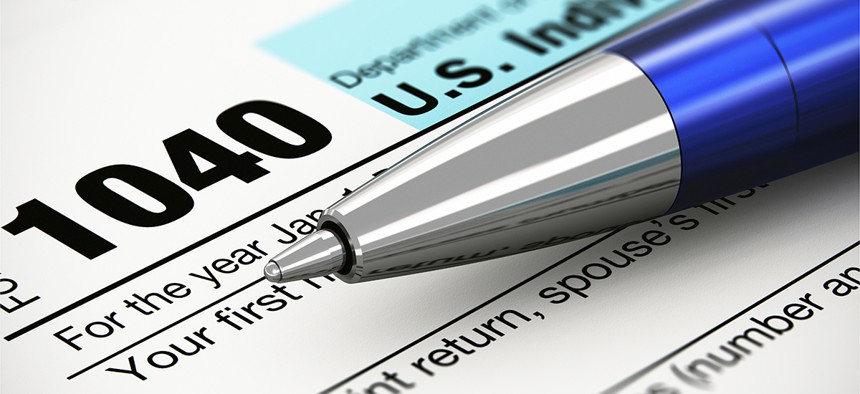
Oleksiy Mark/Shutterstock.com
Americans Love Paying Taxes
Residents of the United States are unusually likely to see chipping in their share as a civic duty, a moral obligation, and a patriotic act.
That Americans hate taxes has become a truism, but it’s not true. Although they disagree sharply about how tax money should be spent, most Americans actually take pride in paying their taxes. Taxpayers in the United States are unusually honest and reliable compared to those in other countries. And, increasingly, Americans are voting for tax hikes.
For my doctoral research on Americans’ experience of taxpaying, I conducted interviews with 49 people in 21 states about their sentiments on taxes. The single most surprising thing I learned is that Americans feel a deep pride about being taxpayers. “It feels good to be able to contribute,” said a 28-year-old from Utah, “and to know that you’re part of the reason why there’s an infrastructure in place.” A woman from Florida agreed. “I feel like it’s a contribution to society and for the future,” she said. “When I’m gone, maybe my little bit of money that I’m putting in is paying somebody else’s Social Security or Medicare or whatever.” (Because the interviews also covered tax evasion, all respondents were promised anonymity in exchange for their participation in the study.)
These respondents are not exceptional. In national surveys, over 95 percent of Americans agree with the statement, “It is every American’s civic duty to pay their fair share of taxes,” and more than half see taxpaying as “very patriotic.” One man from Ohio called it a responsibility to “the Founding Fathers.” A former Marine said taxpaying is “the cost of being an American,” while a man from California said tax avoidance is the equivalent of “shorting the country.”
The feeling is bipartisan. Surveys show that Republicans are significantly more likely than Democrats to agree that taxpaying is a moral responsibility. One woman in Kansas called taxpaying “a responsibility that we have to our country as citizens” because “the country has to be taken care of.” She is a Christian conservative active in her local Tea Party group. While Tea Party activists and other staunch conservatives object to paying for “the Obama agenda,” as she described it, they regularly use the status of “taxpayer” as shorthand for being an upstanding, contributing citizen.
You might wonder if these attitudes are nothing more than a nice sentiment, but Americans put their money where their mouths are, so to speak. Compared to 14 European countries, Americans report the highest willingness to pay taxes, and the United States has one of the highest rates of tax compliance in the developed world. One might credit this to fear of the IRS, but economists have concluded that high-compliance rates in the U.S. cannot be explained solely by the level of enforcement.
Americans are also increasingly willing to vote for higher taxes. I looked at every state-level ballot measure since 1976 that potentially increased or decreased tax revenue. In the early 1980s, one tax increase in five passed; since 2000, about one in two has passed. States have managed to increase sales, income, property, and cigarette taxes by putting the issue directly to the voters. Times have changed since the Reagan-era “tax revolt.”
Almost every American pays taxes in some form. The idea, sometimes proclaimed by conservatives, that half of Americans are getting government benefits tax-free, is patently false. Grandma may not pay income tax since she retired, but she still pays sales tax at the store and property tax on her home. A working mom might not earn enough to pay income taxes, but she pays gas tax at the pump, and supports Grandma by chipping in some of her wages to Social Security and Medicare. These taxes are far from negligible, especially for very low-income people. According to the Institute on Taxation and Economic Policy, people earning less than $19,000 a year pay an average of almost 11 percent of their income in state and local taxes, compared to the 5 percent paid by the top 1 percent of earners. Americans don’t think taxes are fair just because someone else is footing the bill.
As taxpayers, Americans believe they have a stake in our political system. Many of my interviewees saw taxpaying as closely tied to their right of political participation. The Tea Party activist from Kansas says that, in addition to taxpaying, citizens have a responsibility to “speak out on things.” Another interviewee, a senior citizen in Texas, seems to agree. “Obeying the law is a responsibility,” she says. “If the law is unfair or unjust, then there is another responsibility: that of trying to overturn it or stop it.” To be a taxpayer is to be invested in political decision-making, and therefore obligated to participate.
Almost everyone is also concerned that government officials are not held accountable for how tax dollars are spent. Attitudes towards Congress areexceptionally negative, and doubts about political leaders often taint the taxpaying experience. My interviewee in Utah described paying taxes as bittersweet. “You know, I’ve heard of taxes as paying for civilization, to be able to live in a civilized society, and, so I like that aspect of it. But I wish that I had a bigger voice.” The senior citizen from Texas worried that taxes are “feeding the bureaucracy.” But she still believes that paying taxes is a responsibility we have to one another. A resident of the Gulf Coast, she told me that taxes are “supposed to pick us up off our roofs when the water gets too high.” Or, as another interviewee in Florida put it, “You know, no man is an island. We are all in this together.”
(Image via Oleksiy Mark/Shutterstock.com)






